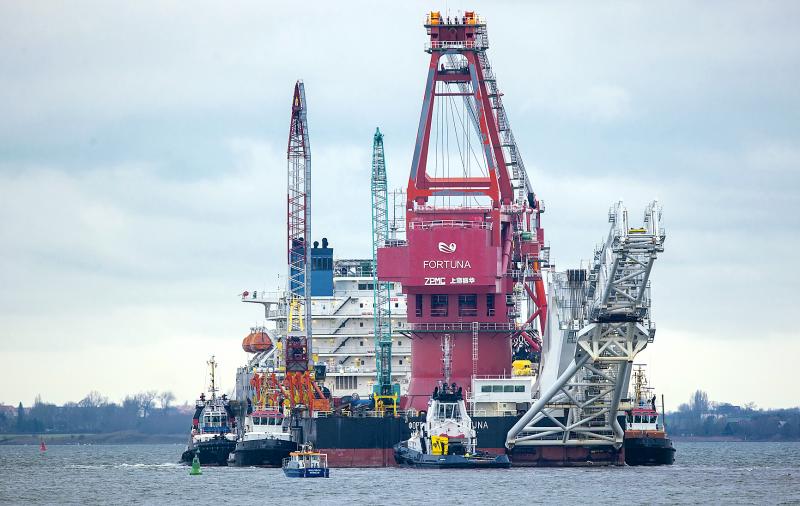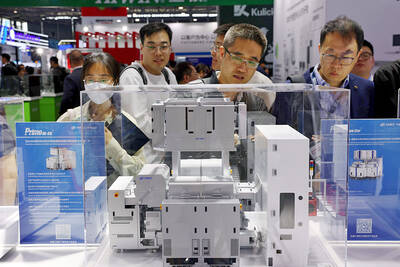The International Energy Agency (IEA) on Tuesday urged Russia to step up gas deliveries to Europe in anticipation of higher winter demand, as tight global supply pushes prices skyward.
“Russia could do more to increase gas availability to Europe and ensure storage is filled to adequate levels in preparation for the coming winter,” the IEA said in a statement.
Opening the tap would be “an opportunity for Russia to underscore its credentials as a reliable supplier to the European market,” it added.

Photo: DPA via AP
Higher demand, including from extremes of hot and cold weather this year, and squeezes on supply due to “a series of unplanned outages and delays across the globe and delayed maintenance from 2020” have boosted gas prices, the IEA said.
Prices for electricity in Germany and Spain “have been around three or four times the averages seen in 2019 and 2020” in the past few weeks, in part down to higher gas prices, it added.
However, Moscow has made it clear that it is waiting for its divisive Nord Stream 2 pipeline to Germany to come online before delivering more gas.
“There’s no doubt that the quickest possible entry into service of Nord Stream 2 will largely balance out the price parameters of natural gas in Europe,” Kremlin spokesman Dmitry Peskov said this week.
The pipeline was completed this month in the face of objections from Germany’s eastern EU and NATO allies such as Poland, the Baltic states and the US, which say it gives Moscow too much control over Europe’s energy supply.
The US Department of State has called Nord Stream 2 “a Russian geopolitical project that’s a bad deal for Europe.”
Ukraine — in conflict with Russia since Moscow’s 2014 annexation of Crimea — has warned Europe that the pipeline could be used by Moscow as “a dangerous geopolitical weapon.”
The pipeline still needs approval from Germany’s regulator — including a potentially months-long analysis by the European Commission — before entering service.
“Nord Stream 2 is not a project in Europe’s common interest,” a European Commission spokesman said.
Brussels’ “objective is to make sure Nord Stream 2 works in a transparent and non-discriminatory way ... in line with international and European energy law,” he added.

SEMICONDUCTOR SERVICES: A company executive said that Taiwanese firms must think about how to participate in global supply chains and lift their competitiveness Taiwan Semiconductor Manufacturing Co (TSMC, 台積電) yesterday said it expects to launch its first multifunctional service center in Pingtung County in the middle of 2027, in a bid to foster a resilient high-tech facility construction ecosystem. TSMC broached the idea of creating a center two or three years ago when it started building new manufacturing capacity in the US and Japan, the company said. The center, dubbed an “ecosystem park,” would assist local manufacturing facility construction partners to upgrade their capabilities and secure more deals from other global chipmakers such as Intel Corp, Micron Technology Inc and Infineon Technologies AG, TSMC said. It

EXPORT GROWTH: The AI boom has shortened chip cycles to just one year, putting pressure on chipmakers to accelerate development and expand packaging capacity Developing a localized supply chain for advanced packaging equipment is critical for keeping pace with customers’ increasingly shrinking time-to-market cycles for new artificial intelligence (AI) chips, Taiwan Semiconductor Manufacturing Co (TSMC, 台積電) said yesterday. Spurred on by the AI revolution, customers are accelerating product upgrades to nearly every year, compared with the two to three-year development cadence in the past, TSMC vice president of advanced packaging technology and service Jun He (何軍) said at a 3D IC Global Summit organized by SEMI in Taipei. These shortened cycles put heavy pressure on chipmakers, as the entire process — from chip design to mass

Germany is to establish its first-ever national pavilion at Semicon Taiwan, which starts tomorrow in Taipei, as the country looks to raise its profile and deepen semiconductor ties with Taiwan as global chip demand accelerates. Martin Mayer, a semiconductor investment expert at Germany Trade & Invest (GTAI), Germany’s international economic promotion agency, said before leaving for Taiwan that the nation is a crucial partner in developing Germany’s semiconductor ecosystem. Germany’s debut at the international semiconductor exhibition in Taipei aims to “show presence” and signal its commitment to semiconductors, while building trust with Taiwanese companies, government and industry associations, he said. “The best outcome

Semiconductor equipment billings in Taiwan are expected to double this year, as manufacturers in the industry are keen to expand production to meet strong global demand for artificial intelligence applications, according to SEMI, which represents companies in the electronics manufacturing and design supply chain. Speaking at a news conference before the opening of Semicon Taiwan trade show tomorrow, SEMI director of industry research and statistics Clark Tseng (曾瑞榆) said semiconductor equipment billings in Taiwan are expected to grow by an annual 100 percent this year, beating an earlier estimate of 70 percent growth. He said that Taiwan received a boost from a